Written by Emma Adams on behalf of The Farm Carbon Toolkit
In a first for the Soil Farmer of the Year competition, in October 2023 our series of farm walks took place in Northern Ireland. A group of farmers, academics and industry professionals met at Drumard Farm, just outside Cookstown in County Tyrone, to hear from Bronagh O’Kane on how she is transforming her farming business with resilient soil at its heart.
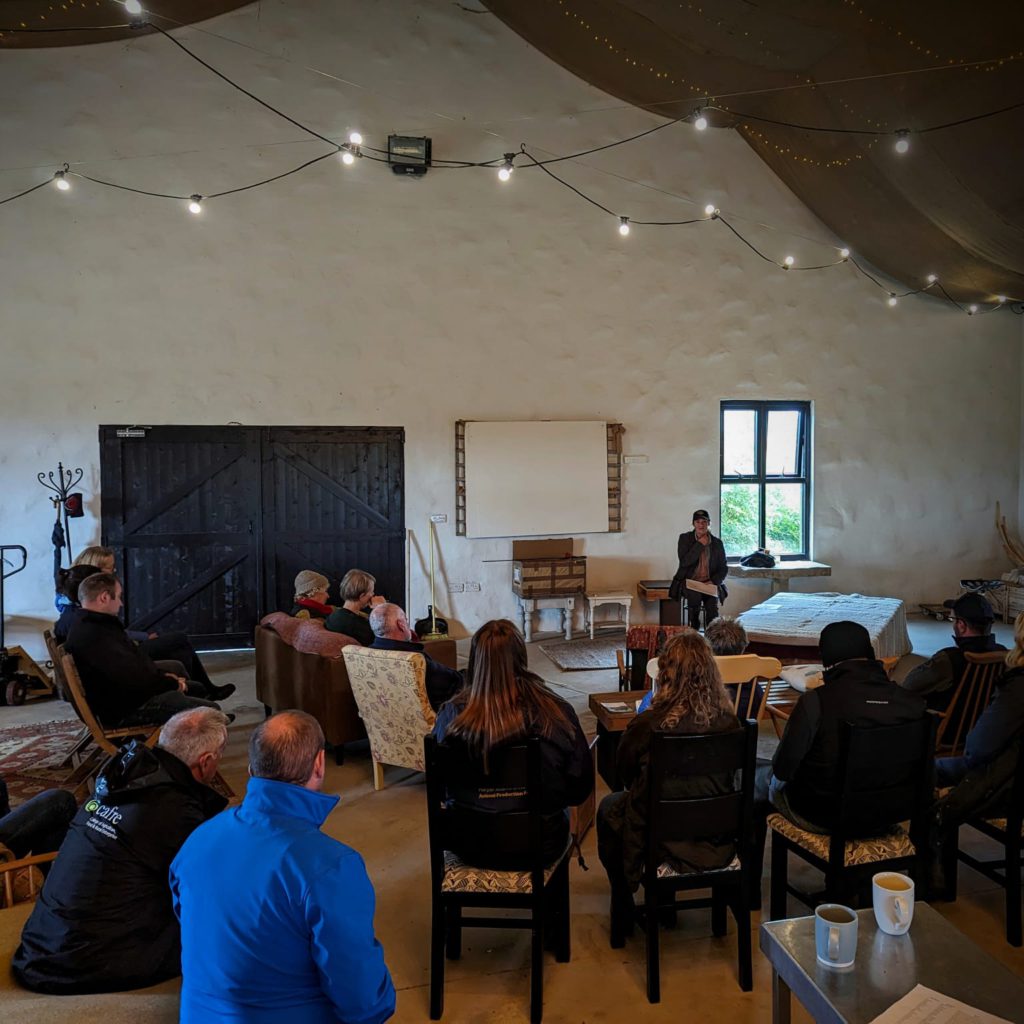
Bronagh introducing the farm to the group
Having come back to the farm in 2020, Bronagh began a journey to transform the soil. Historically the farm supported continental cattle breeds with a high reliance on imported feed, Bronagh has transitioned this system to more traditional breeds managed on herbal leys and ever-increasing diversity grasslands. Utilising a rotational paddock system she has extended the grazing period so that cattle can be out by 4 weeks and soils are more resilient to the extremes of dry and wet weather. Bronagh has started producing vermicast and composting to improve soil biology; focusing on natural inputs and a softer approach with foliar fertilisers where needed to manage historically compact and imbalanced soils. The walk will provide the opportunity to discuss and demonstrate the practices undertaken at the farm and the ongoing challenges and successes that Bronagh sees in her system.
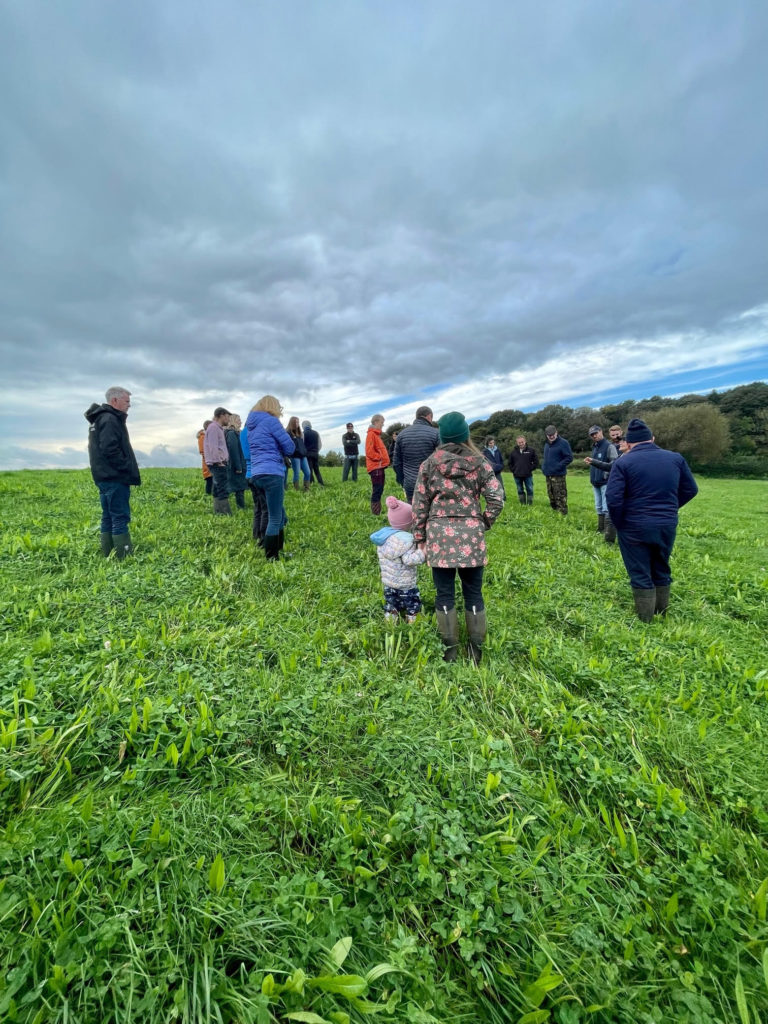
The beginning of the farm walk
At Drumard Farm, Bronagh was told she had poor soils and no doubt they are a challenge, with testing suggesting an average of 45% silt and 45% clay they are tight and sticky, with little aggregation or infiltration. As such, understanding what was needed for the soil to function better was a priority for Bronagh, with a great deal of research it was understood that the high magnesium, bacterially dominant soils were being held back by a mineral imbalance, compaction from big tractors and heavy cows.
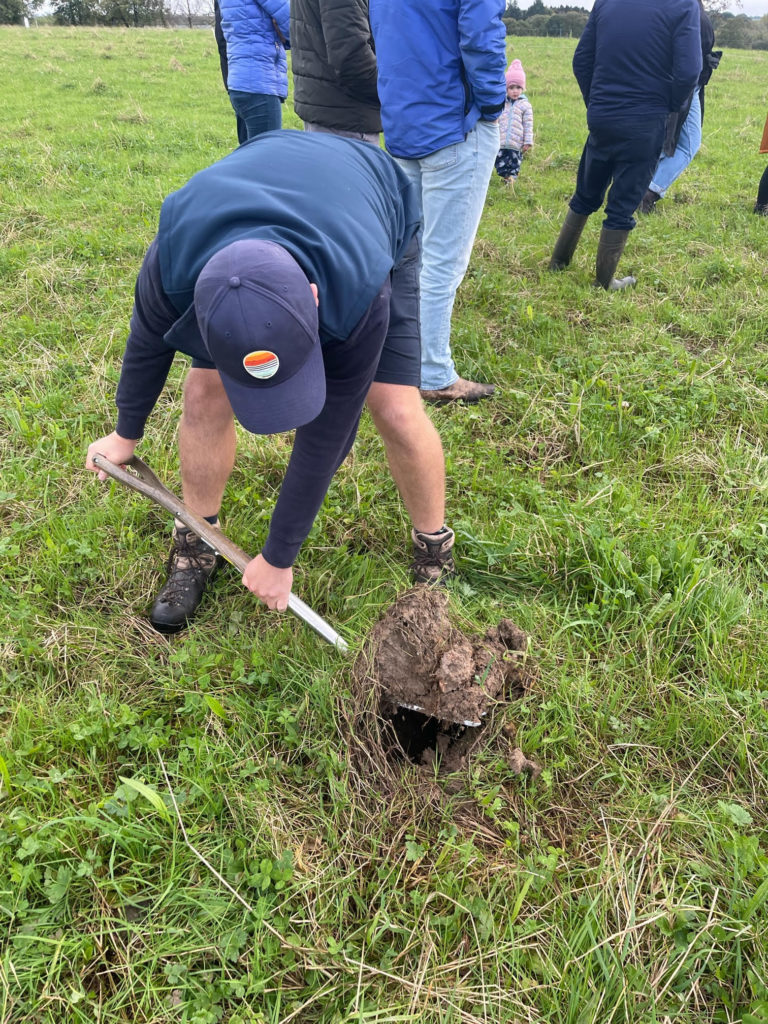
Inspecting the soil condition following the autumn rain
Changing the livestock system at the farm has been central to Bronagh’s evolving management. The cattle business has been streamlined, and as such the previous finishing and store systems have been stopped instead to focus on a suckler system with pedigree Charollais sheep. The sheep are high value stock, as Bronagh suggests there isn’t the acreage for a larger flock, instead, she buys in September before selling the ewes with lambs at foot in the spring and runs the rest of the flock throughout the year. This system works well as there is the housing space available over winter and also the sheep provide a good opportunity to clean up the last of the grass when it is too wet for the cattle to graze. Previously the farm also had Charolais cattle, but these have been restocked, reducing numbers from around 80 to 50 on a sucker system focussing on more native breeds such as Speckle Park, Shorthorn and Hereford crosses with an Angus Bull. Even with these changes, Bronagh found that those animals with a Limousin cross within the breeding still comparatively lost condition on the new system which is thought to be from underlying epigenetic traits. This has led Bronagh to source more local Shorthorn heifers which are better adapted to a grass-based system.
Bronagh utilises plant diversity as an indicator of the status of the soil. The species that may dominate in a field or area can suggest what the underlying composition may be – chickweed for excess nitrogen, low calcium or high potassium or creeping buttercup thrives where there has been poaching, bare soil and a low pH. Like many farms, docks have historically been widespread at the farm, often indicating compaction and an anaerobic soil environment. Bronagh’s approach to dock management is to change what has historically not been working – sprays and topping – and instead let them grow and allow the dock beetle to get to work combined with a cut for silage around June. This understanding of what the plants are indicating has led Bronagh to stop spraying and minimising fertiliser use to zero, instead focusing on balancing the soil and improving the health of the biome. She explains:
“Biodiversity, long rest periods and grazing management can change soils – you’re not stuck with what you have”
Grassland management is central to how the business is now run. Bronagh has diversified existing grasslands into multi-species swards despite the testing conditions and low pH of the farm. On the walk, the group visited a newly established herbal ley that had been planted in a field that was pH 5.8.
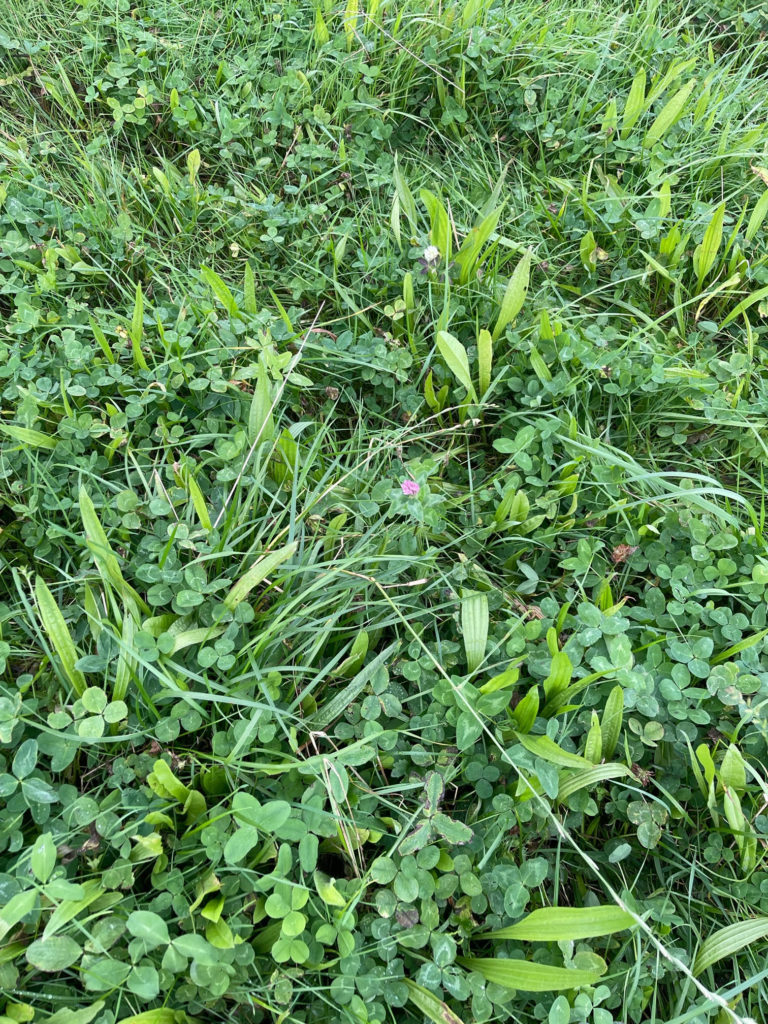
The newly established multi-species herbal ley
The 15-way mix contained species such as sainfoin, plantain and chicory and Bronagh has subsequently experimented with both cutting and grazing, which has led to discussions with contractors on cutting heights, timings and more to best maintain the sward. For Bronagh, managing these lays to allow the full diversity is important, with the understorey plants encouraged through the aforementioned considerations in combination with the paddock grazing system. Bronagh has experimented with the paddock grazing timings and methods, including grazing the cows on knee-high swards which resulted in moving them faster but increasing the size of the paddock as the cows were found to be trampling rather than eating following heavy rain. Bronagh suggests:
“The definition of overgrazing is letting them get that second bite – it is so important for my fragile, shallow roots to rest”
In addition to the home farm, Bronagh also has a 30ac National Trust tenancy on a zero-input system supporting both a rotational grazing and cutting platform. For Bronagh, having the right livestock that will thrive on a grass based system is key to success. As such, she puts the heifers on the poorest fields to determine which animals will be kept as some breeding is adapted better to the system than others.
The walk also incorporated learning more about how Bronagh is using vermicast to provide nutrition and balance to her soils. Vermicast, or worm castings is made by using worms to compost organic amendments such as farmyard manure, food waste, wood chip etc to create a soil conditioning fertiliser.
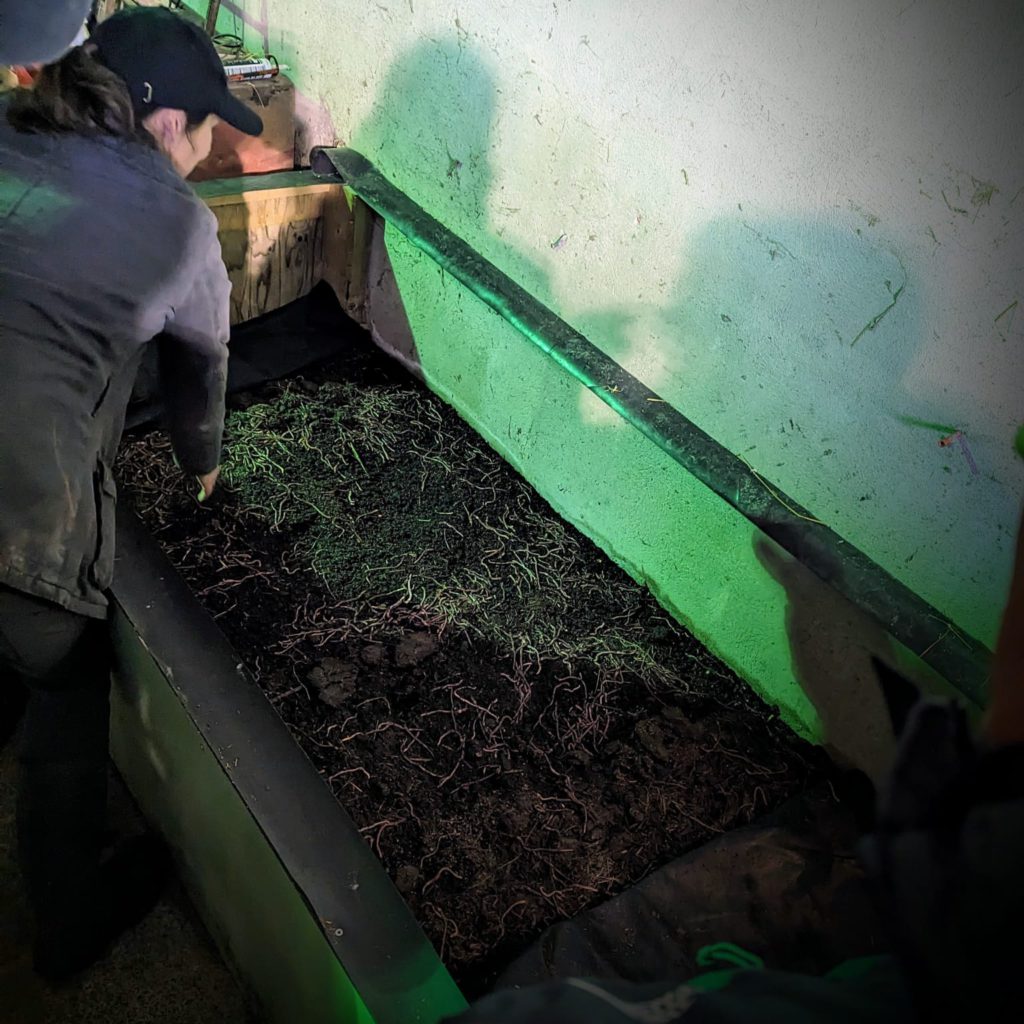
Worm farm whereby organic materials are broken
down to create the vermicast
On the farm, vermicast is used to provide nutrients, stabilise pH and also as a coating on any new seed that is established. Bronagh applies her vermicast through a sprayer after making a ‘compost tea’. The vermicast is added to a porous ‘tea bag’ within an IBC filled with water which is then agitated and aerated using a bubbler to extract the nutrients and beneficial organisms which vermicast contains, the resulting liquid is then applied to land to stimulate soil biology and provide nutrients. Bronagh is aiming for a 1:1 ratio of fungi to bacteria which the vermicast and good soil management will help promote.
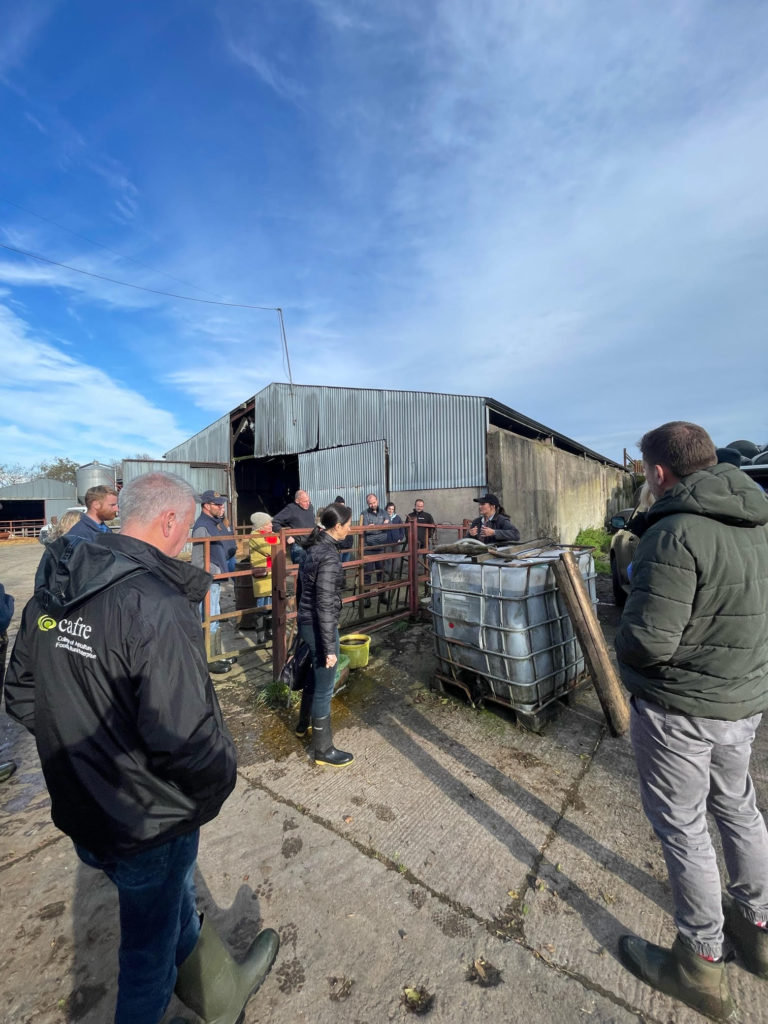
Bronagh explains the process of using vermicast
to make a compost tea
Regularly conducting Brix testing has allowed Bronagh to understand how to best apply the vermicast and the benefit it is having to her land, with fields which have had no fertiliser, slurry or inputs other than vermicast scoring 12, with Bronagh suggesting that every 1% increase in a Brix result can give a 0.5-0.75kg improvement in liveweight gain in the cattle. Any amendments which Bronagh applied to the land are designed with this goal in mind, alongside the cost and feasibility within her system. An example of this is that she has been experimenting with using egg shells to help aid the calcium balance and flocculate the soil; this can be spread with a conventional fertiliser spreader rather than other products which can have additional costs due to the price of both material and the contractor required to apply the product.
Since 2015, the Soil Farmer of the Year Competition has helped to find, promote and champion UK farmers who are passionate about safeguarding their soils and building resilient businesses. As part of the competition, the top three farmers host farm walks that bring farmers together to share good practice and innovations that improve soil health. The 2024 round of the competition opens on 5th of December 2023, which is World Soils Day – if you are interested in finding out more, entering the competition or nominating someone who you think is deserving of this award further details can be found on the Farm Carbon Toolkit website or https://farmcarbontoolkit.org.uk/soil-farmer-of-the-year/
